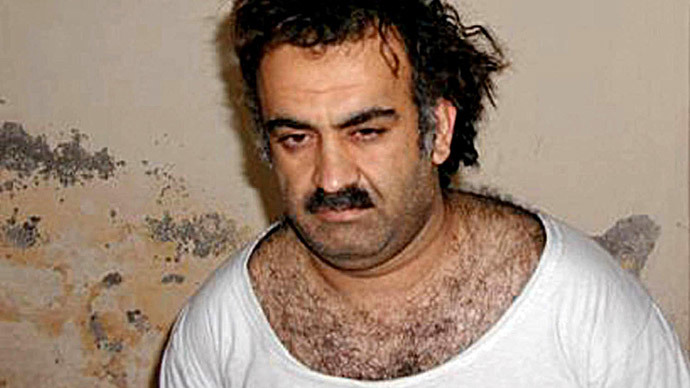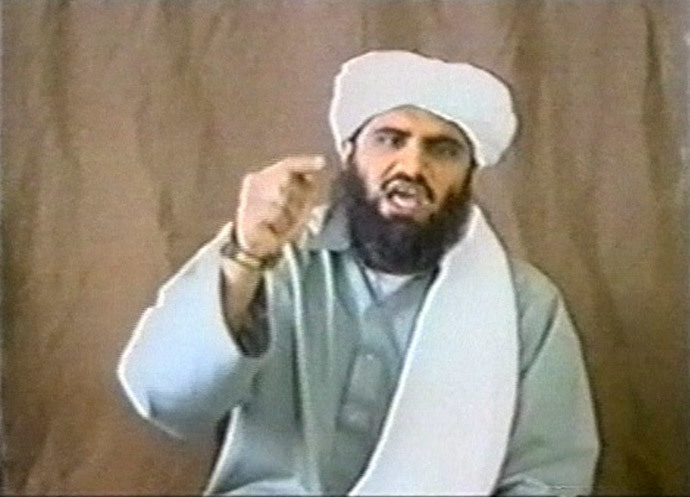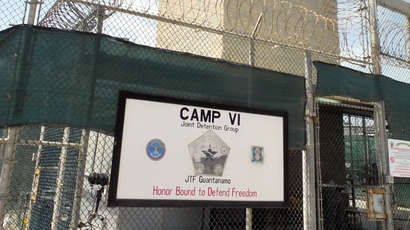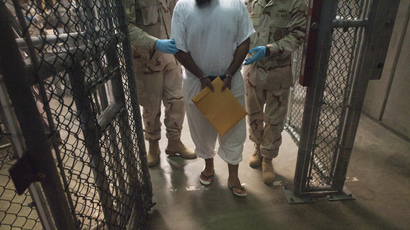Key witness testimony in bin Laden son-in-law’s trial subject to block attempt by prosecution

Prosecutors tried to block the testimony of an alleged mastermind of the 9/11 attacks in the terror trial of Osama bin Laden’s son-in-law, after a 14-page statement providing, among other things, reasons for Al-Qaeda operations against the US.
The written testimony was followed by a request from attorneys for bin Laden’s son-in-law to allow for a closed-circuit video link from Khalid Sheikh Mohammed’s Guantanamo cell, because he was “unavailable to physically appear at the trial, and his testimony is necessary to prevent a failure of justice in this matter,” according to Suleiman Abu Gaith’s lawyers.
Abu Gaith's was arrested in February, originally charged with one count of conspiracy to kill Americans. A superseding indictment unsealed, however, added two new charges: conspiracy to provide material support and resources to terrorists, and providing material support and resources to terrorists.
The prosecution didn’t want the video interview with Mohammed to happen, citing that the request had been submitted too late, and the earlier fact that Mohammed had said he wouldn’t testify.
They argued at bin Laden’s son-in-law’s two-week trial that Abu Gaith, 48, was Al-Qaeda’s spokesman and recruiter of fighters, and that he knew of future attacks, something the defense said there was no evidence of, hence the late request for Mohammed to appear.
In the February statement, submitted to New York’s federal court
late on Sunday, Khalid Sheikh Mohammed defended Suleiman Abu
Gaith, seeing him as merely a tool for rallying fighters to join
the terrorist group and that his duty didn’t necessitate knowing
the details of military operations “for fear that they would
be botched or miscarried.” The skills he insisted were
needed for such a job had to do with being an “eloquent,
spellbinding speaker,” according to the statement.
Also noteworthy was a historical background into past US actions
in Afghanistan. He called the terrorist cell’s mission a “war
of attrition,” according to information obtained by The
Guardian.
The statement is one of a very few issued by Mohammed following his 2003 capture by the United States. Mohammed himself said he wanted to appear on screen for the interview, as the initial February questions from attorneys reminded him too much of the leading style of his interrogators at Guantanamo.

An extensive part of Mohammed’s preliminary February interview also focuses on a history of the ‘Al-Qaeda versus the US’ conflict, especially how the 2001 attacks led to a costly and weakening change in US foreign policy, which was allegedly the plan all along.
“Every state of emergency declared and every change of alert level that inflicts specific procedures on the military and civilian sectors costs the country millions of dollars. It is enough that the US government has incurred losses upwards of a trillion dollars in the wars it has waged in the aftermath of 9/11, the bleeding of which continues to this day,” the testimony read.
In 2007, Mohammed eventually confessed to playing a large role in the 9/11 attacks and 31 other acts of terrorism, to varying degrees. The later 2014 testimony contained in part the statements he had made back then concerning an all-out US war on Islam.
The interview with Mohammed, who’s been at Guantanamo since 2006, portrayed the ongoing conflict as that between a wealthy, worldwide war machine with aspirations of global domination and a much smaller, but more cunning adversary.
“The enemy occupier of the Islamic world is a super power with a budget of billions while we are a small organization whose members are limited in numbers and capabilities. There is no comparison between the two sides, so it is obvious that we would have to resort to a long war of attrition to which the military and media alike contribute,” he said during the initial interview, which became the basis of the 14-page document.

He likewise attacked the reasons for the US operation of the Guantanamo prison as hypocritical and self-serving. According to Mohammed, Americans have never shied away from dealing with those it deemed terrorists, funding extremist Islamic organizations since their rise in the 1980’s, especially where it concerned a proxy war against the Soviet Union in Afghanistan. “At the time, Jihadist speeches were accepted and even supported and applauded by the West because they mirrored their strategic interest,” he said, adding that the terminology following the 90’s Islamist uprisings in Bosnia and Chechnya changed sharply from ‘Mujahid’ to ‘terrorist’, and from ‘Jihad’ to ‘terrorism’.
He saw the expansion of Al-Qaeda in Afghanistan as rooted in the American neglect of the country after the Soviet pullout; he saw the US foreign policy towards Afghanistan as “stupid” and “completely blind to what was happening in the camps.”
Mohammed further said that the US also worked closely with Pakistani intelligence services to weaken Afghanistan in the 90’s. “All of that was done to ensure that even if the Mujahideen prevailed and expelled the Russians they would be left powerless and Afghanistan would remain dependent on Pakistan, India, Iran or Tajikistan, just as the West desired,” Mohammed stated.
The last time Mohammed had made a statement was in 2008, at a military hearing later abandoned and followed by a confession to participation in the 9/11 attacks.
Following his Pakistan capture in 2003, Mohammed suffered water-boarding 183 times in one month at the hands of the CIA.













